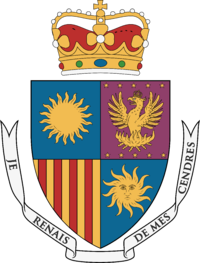Treaty between Normark and Nouvelle Alexandrie
The Treaty of friendship and cooperation between the Kingdom of Normark and the Federation of Nouvelle Alexandrie was proposed in 1719 AN. The Treaty was requested and negotiated by Normark to ensure continued assistance and involvement by Nouvelle Alexandrie in assisting Normark during its fight against the Confederacy of the Dispossessed through Operation Sable Shield, which started in 1718 AN. In late 1719 AN, with the forces of the Dispossessed approaching Sårensby, the Keltia Command requested the activation of the military component of Operation Sable Shield as part of the Wars of the Dispossessed.
The Treaty establishes the relationship between both countries and includes provisions for permission for the Federal Forces of Nouvelle Alexandrie to be present in Normark's territory to assist in the defeat of the Confederacy of the Dispossessed.
Background
Text

TREATY OF FRIENDSHIP, COOPERATION AND NAVIGATIONBETWEEN
KINGDOM OF NORMARK
AND THE
FEDERATION OF NOUVELLE ALEXANDRIEIt being of great advantage to establish relations of friendship and commerce between His Majesty, the King of Normark and His Majesty, the King of Nouvelle Alexandrie, the undersigned, having exchanged their powers, mutually admitted as sufficient, have agreed, on the part of their respective Sovereigns, to conclude a Treaty of Friendship, Commerce and Navigation, as follows:
Article I – Peace and friendship.
- There shall be a firm and perpetual state of peace and friendly relations between His Majesty the King of Normark, his successors, and His Majesty the King of Nouvelle Alexandrie, his heirs and successors, and between Normark and Nouvelle Alexandrie, and between their Citizens, without discrimination.
Article II - Sovereignty and territorial integrity.
- Each High Contracting Party shall respect the independence, sovereignty and territorial integrity of the other party. The High Contracting Parties shall continue to develop and consolidate the relations of sincere friendship, good neighbourliness and comprehensive cooperation existing between them on the basis of the aforesaid principles as well as those of equality and mutual benefit.
- Territorial integrity includes the territory of a High Contracting Party to the extent acknowledged and published by the Micras Cartography Society. The territory extends 24 kilometres from the baseline coast of the High Contracting Party. Including the localities where the coastline is deeply indented and cut into, or if there is a fringe of islands along the coast in its immediate vicinity, the method of straight baselines joining appropriate points may be employed in drawing the baseline from which the breadth of the territorial sea is measured.
- The reserve zone of a High Contracting Party extends 360 kilometres from the baseline coast. The economic and environmental resources within this zone belong fully to that High Contracting Party. In special situations where the territorial waters or the reserve zone of the High Contracting Parties would overlap, the line of separation will be drawn along the midpoint between the baseline of each High Contracting Party.
Article III - Airspace.
- Each High Contracting Party commits that any overflight of its airspace by aircraft registered upon the territory of the other High Contracting Party, whose source and destination are outside the jurisdiction of the Overflown High Contracting Party and which make no intermediate landing upon the territory of the Overflown High Contracting Party, shall be considered to fall outside the remit of customs or immigration regulations and wholly outside the jurisdiction of any Third Parties, without prejudice to the exclusive right of the Overflown High Contracting Party to approve or deny such overflight as it sees fit.
- The High Contracting Party can set up a Prohibited airspace, an overflight is strictly prohibited. The High Contracting Party informs about Prohibited airspace and appropriate punitive measures follow an overflight of an aircraft registered with the other High Contracting Party.
Article IV – Navigation.
- A High Contracting Party, shall in its own territorial waters and reserve zone, allow ships under the flag of the other Contracting Party innocent passage, so long as it is not prejudicial to the peace, good order or security of the other High Contracting Party. Such passage shall take place in conformity with this Treaty and with other rules of international law. The High Contracting Parties shall further endeavor to keep channels of commerce open, for their mutual benefit, along their northern coastlines on the continent of Keltia.
- Passage of a ship of one High Contracting Party shall be considered to be prejudicial to the peace, good order or security of the Other High Contracting Party's territorial if sea it engages in any of the following activities:
- any use of force against the sovereignty, territorial integrity or political independence of the other High Contracting Party;
- any exercise or practice with weapons of any kind;
- any act aimed at collecting information to the prejudice of the defence or security of the coastal State;
- any act of propaganda aimed at affecting the defence or security of the other High Contracting Party
- the launching, landing or taking on board of any aircraft;
- the launching, landing or taking on board of any military device;
- the loading or unloading of any commodity, currency or person contrary to the customs, fiscal, immigration or sanitary laws and regulations of the coastal State;
- any act of negligent, reckless, or wilful pollution contrary to this Treaty;
- any fishing activities;
- the carrying out of research or survey activities;
- any act aimed at interfering with any systems of communication or any other facilities or installations of the coastal State;
- any other activity not having a direct bearing on passage.
- Furthermore, ports of one High Contracting Party shall allow ships under the flag of the other High Contracting Party safe harbour and refuelling, with the same costs involved as for domestically flagged ships of the same standard and class.
- The High Contracting Parties shall coordinate with and assist one another in maritime emergencies, rescue missions, and disasters.
Article V – Diplomatic mission.
- The High Contracting Parties will maintain regular contacts with each other on major international problems affecting the interests of both of their countries and governments by means of meetings, and exchanges of views between their leading statesmen, visits by official delegations and special envoys of the governments, and through diplomatic channels.
- The High Contracting Party will make an embassy available for each other.
- For the embassy, associated grounds, associated vehicles, leading statesmen, visits by official delegations, special envoys of the governments and ambassadors, diplomatic immunity applies.
- Each High Contracting party recognizes and respects the procedures of acceptance by the ambassador, by handing over a letter of credence, which is addressed from one head of state to the other asking to give credence.
Article VI - Recognition of bureaucracy.
- Each High Contracting Party gives to the other full faith and credit to all public acts, records, contracts and judicial proceedings in the field of civil law, including records and documents on marriage, property, titles, death and inheritance, in as much as any act, record, document, contract, proceeding is done according to the law, except as such acts may violate the compelling public policy of the other High Contracting Party.
Article VII - Sanctuary.
- Neither of the High Contracting Parties shall bestow the right of sanctuary upon any citizen or subject of the other where they have born arms against their sovereign or engaged in acts of treason, treachery, espionage, or subversion. The High Contracting Parties shall instead hold such individuals secure and arrange for their extradition at the earliest moment. In all other instances,the granting of sanctuary to any who seek it may be granted at the discretion of the High Contracting Party and it shall be the obligation of the other to demonstrate that an offense has occurred in order to request and obtain extradition through the judicial procedure of the High Contracting Party concerned.
Article VIII - Military Cooperation.
- Subject to the full permission of the Kingdom of Normark, the Federation of Nouvelle Alexandrie shall be granted the right to station military forces within the territory of Kingdom of Normark to aid in its defense. The specifics of this military cooperation, including the number of forces, the location of the deployment, and the scope of activities, shall be determined through mutual consultation and agreement between the High Contracting Parties.
- The military forces of the Federation of Nouvelle Alexandrie shall respect the sovereignty, laws, and regulations of the Kingdom of Normark and shall not engage in any activities that may harm the interests of Kingdom of Normark or its citizens.
Article IX - Interpretation.
- Any difference of interpretation of any Article or Articles of this Treaty which may arise between the High Contracting Parties will be settled bilaterally by peaceful means in a spirit of mutual respect and understanding.
Article X - Ratification.
- This Treaty enters into force upon the exchange of ratification by Both High Contracting Parties in accordance with their respective domestic procedures.
Article XI - Force.
- This Treaty is in force for six Norton years. Should a High Contracting Party withdraw from this Treaty, this must be communicated to the government of the Other Contracting Party before the expiry of the Treaty. Unless no withdrawal is communicated before the end of the expiry period, the Treaty is renewed for another six years, with the same stipulations for withdrawal and continuance as in the first period.
Signed on in Elijah's Rest on 12.XIV.1719 AN:
For His Majesty, King of Normark:
- Arnold Christianssønn Einhorn
- Prime Minister of Normark
For His Majesty, King of Nouvelle Alexandrie:
